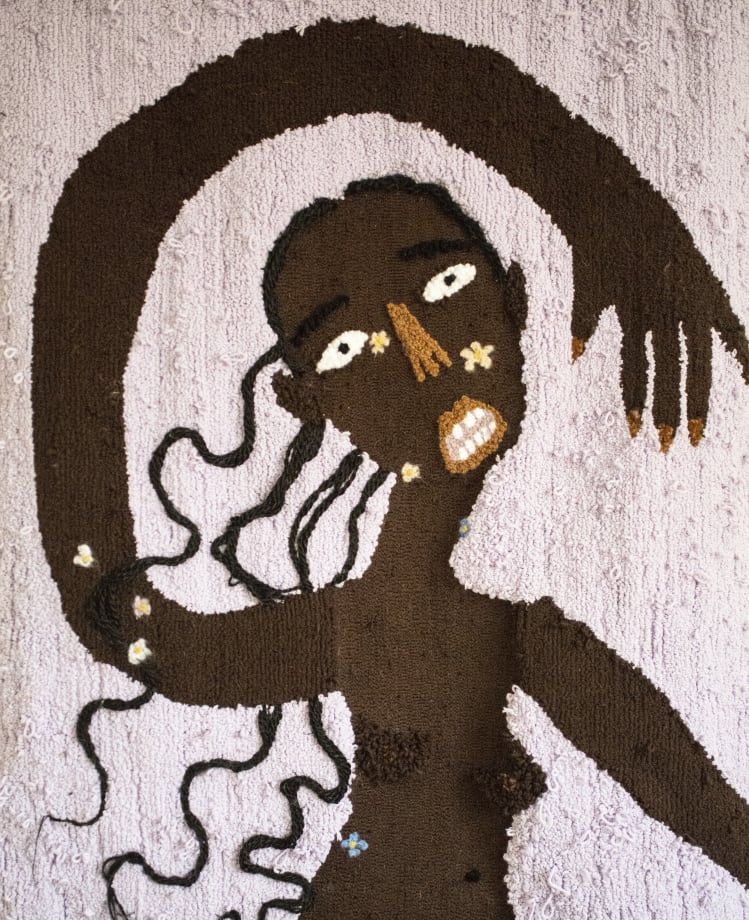Watch Anya in -convsersation with journalist and author Charlotte Jansen.
Following sell out presentations at 1-54 London and Salon 94 in New York, as well as acquisitions by the Whitworth, Glynn Vivian and Tullie House museums, Ed Cross is delighted to present Anya Paintsil’s first London solo show, We Are All Made of You, in the gallery's new Garrett Street space.
Initially conceived as an exploration of the artist’s dual Welsh and Ghanaian heritages, Paintsil’s latest works set her family members in conversation with mythical figures. As the artist’s siblings encounter characters from the Welsh epic Mabinogion and those plucked from Ghanaian Akan folktales and Fante proverbs, the significance of the exhibition’s title swims into view; in We Are All Made of You, Paintsil’s work exemplifies an intrinsic thematic overlap as well as a material one.
Incorporating Afro hair styling techniques into tableaus made with rug hooking learnt from her Welsh grandmother, Paintsil’s practice has always talked in plurals – and despite developing on different continents, its foundational processes involve many of the same gestures. As such, spanning skills as well as characters from both Welsh and Ghanaian traditions, We Are All Made of You draws new and old threads into single surfaces.
Take When there are no trees birds will perch on men’s heads; lifting its title from an Akan proverb and its composition from a Fante Asafo flag, the work stars Welsh folk heroine Rhiannon. Traditionally accompanied by three birds, here Rhiannon’s trio have taken up residence on her head in a manifestation of the Akan truism: a curse, a crown, a childish joke, splicing two stories together with all the intuitive antilogic of a dream. Absorbed during our early years, the meanings of proverbs and myths can seem obscure at the best of times; for Welsh Ghanaian Paintsil, each tradition has informed the other.
In Blod, Paintsil turns her hand to the Mabinogion’s Blodeuwedd. Conjured from flowers as a wife for hero Lleu Llaw Gyffes, depictions of Blodeuwedd have reflected culturally specific values and ideals in flux over generations; and with blossoms speckling her face and hair, Paintsil’s Blod is no different. Echoing the artist’s experience of growing up Black in rural north Wales, struggling to locate herself in an insular community, Blod’s brown skin infers a parallel mythology running alongside the Welsh canon – this Blodeuwedd could be a sister of her neighbour Rhiannon or even Paintsil herself. An old story and a new one at once.
Speaking of siblings, Bolognese takes its title from a nickname for Paintsil’s younger brother Levi, based on the Ghanaian name Ebo. Depicted as a little boy, Levi peeks out from a white, fluffy towel after a shower. Rendered in Painstil’s textiles, the tactility of his cocoon radiates from its surface: soft, safe, the image is acutely evocative of the dual vulnerability of nakedness and childhood. Look again, though, and the towel could be mistaken for a robe – Levi for a monk, a crusader, a voyager swathed in robes to protect him from the elements. Is this a mythical hero, or a child on his way to bed? How about both?
As Paintsil’s intimate family scenes meet their neighbouring epic tableaus, the muddling of meaning becomes a two-way street. Folkloric figures start to look more and more like family, and siblings – who you might laugh at after a shower, or bicker with over dinner – seem increasingly supernatural. We Are All Made of You explores connection and disconnection, duality and division, past and present – but as always, Paintsil’s practice wields the hyper-personal as a lens through which to view society’s most enduring narratives.
In locating the people she knows best in stories which have shaped her two cultures, Paintsil puts faces to names (literally, playfully, poignantly), setting a call-and-response in motion across centuries and continents. In her hands, those chasms seem eminently traversable; substituting wool for hair, Wales for Ghana, Blodeuwedd for Bolognese, Paintsil makes as much of equivalence as divergence. If they could speak, Paintsil’s characters would surely echo the show’s name – We are all made of you, after all.

